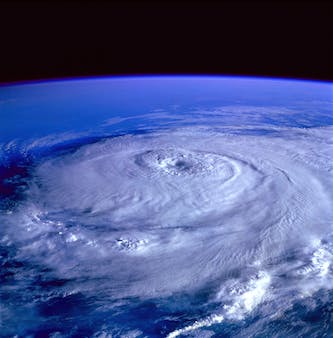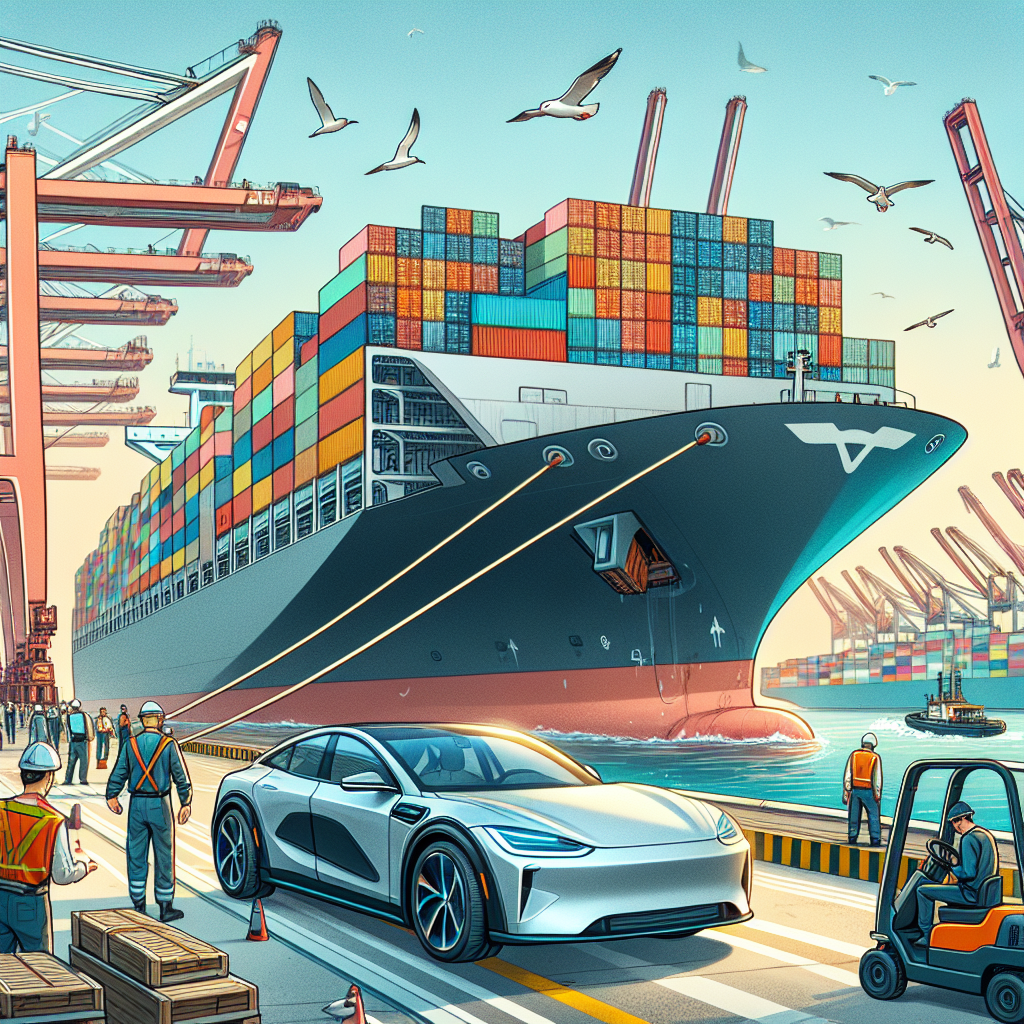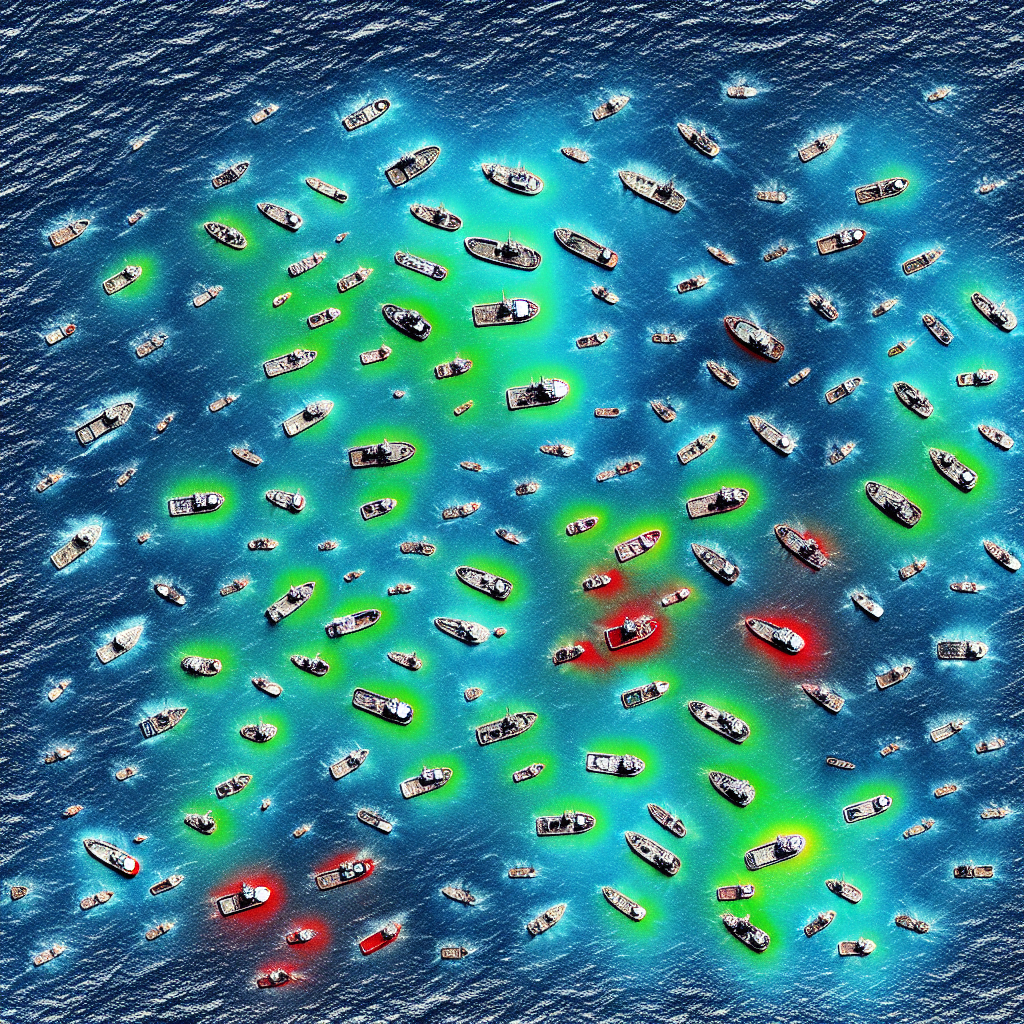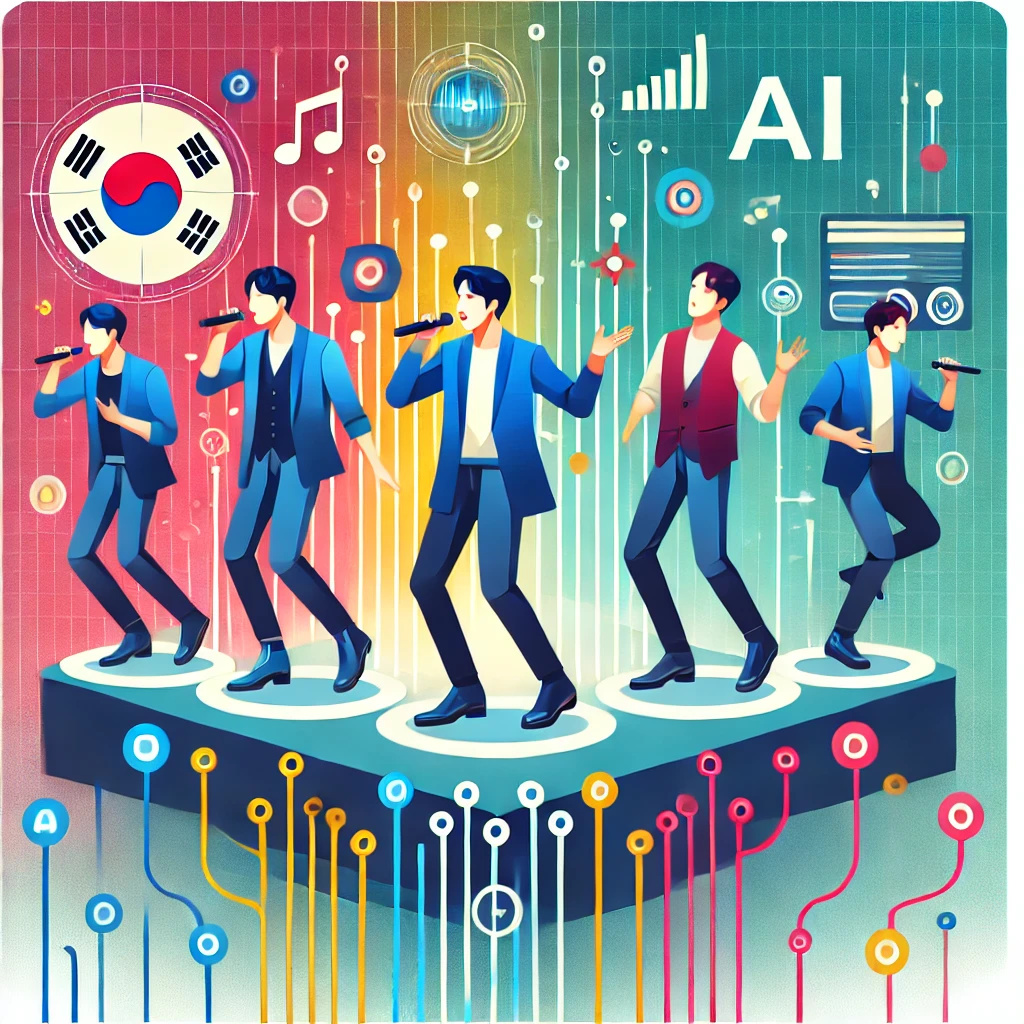Artificial Intelligence (AI) has the potential to save lives by predicting hurricanes more accurately and sooner than traditional methods, say researchers. Google DeepMind’s new AI tool, called GraphCast, successfully predicted the landfall of Hurricane Lee in Canada three days in advance. Traditional weather forecasts have gotten better over time, but AI is a game-changer because it’s fast and can analyze past events. GraphCast is better than the European Medium Range Weather Forecasting model on more than 90% of factors, and it can make forecasts in less than a minute using less computing power.
Traditional weather forecasting involves collecting real-time data from around the world and using supercomputers to simulate weather changes. This method works, but it takes a long time and needs a lot of computing power. AI works differently by using machine learning to analyze historical data and predict weather patterns. GraphCast is accurate because it learns from decades of data and can make forecasts quickly with less computing power. While it may not give as much detail as traditional models, it’s really good at predicting severe events and tracking major storms.
But just because AI is successful doesn’t mean traditional methods will go away. AI models actually work together with traditional approaches because they use data generated by those approaches. GraphCast is open source, so anyone can use it, and many companies and weather organizations are developing their own AI weather prediction tools. The UK’s Met Office is even working with the Turing Institute to explore AI in weather forecasting. However, climate change might make it harder for AI to predict new extremes because it’s based on past weather conditions.
In conclusion, AI has the potential to revolutionize hurricane forecasting by giving us more accurate and timely predictions. GraphCast, made by Google DeepMind, is better than traditional models at predicting severe weather events. But AI models should be used together with traditional methods because they rely on data from those methods. While AI is getting better, climate change might make it harder to predict new extremes. Still, AI in weather forecasting is a big step forward in helping us prepare for and respond to extreme weather events.
Original news source: AI could predict hurricane landfall sooner – report (BBC)
Listen
Slow
Normal
Fast
Group or Classroom Activities
Warm-up Activities:
– News Reporter Role-play
Instructions: Students will work in pairs to role-play a news reporter and an AI specialist discussing the new development in AI weather forecasting. One student will ask questions about the benefits, challenges, and future implications of AI like GraphCast, while the other explains, based on the information from the article.
– Opinion Spectrum
Instructions: Create a line in the classroom representing a spectrum of opinions from “strongly agree” to “strongly disagree.” Read out statements about the use of AI in weather forecasting, such as “AI will completely replace traditional weather forecasting methods in the future.” Students position themselves along the spectrum according to their opinion and discuss their reasoning with the person next to them.
– Vocabulary Pictionary
Instructions: Write down the key vocabulary from the article on cards (e.g., Artificial Intelligence, predict, hurricane, traditional methods, supercomputers, machine learning, severe events). Split the class into two teams. A student from one team picks a card and draws the word for their team to guess. No letters or numbers allowed in the drawings. The team has a time limit to guess the word correctly before the other team gets a chance.
– Synonym Challenge
Instructions: List out key terms from the article (e.g., predict, analyze, accurate, revolutionize, extremes). Students work in small groups to come up with as many synonyms as possible for each term within a set time limit. Afterward, discuss which synonyms are the most accurate and if any have slightly different connotations.
– Future Predictions
Instructions: Ask students to write a short paragraph predicting the future of weather forecasting, using the information from the article. They should consider the role of AI and traditional methods, as well as potential challenges that climate change might pose. After writing, students can share their predictions with the class or a partner and discuss the likelihood and implications of their scenarios.
Comprehension Questions:
1. What is the main benefit of using Artificial Intelligence (AI) in predicting hurricanes according to researchers?
2. How much in advance did Google DeepMind’s GraphCast predict the landfall of Hurricane Lee in Canada?
3. In what way is AI a game-changer for weather forecasting?
4. What are some limitations of traditional weather forecasting methods?
5. How does GraphCast manage to make accurate forecasts?
6. Why won’t traditional weather forecasting methods become obsolete despite the success of AI?
7. What challenges might AI face in predicting weather patterns due to climate change?
8. How does the article suggest AI and traditional weather forecasting methods should be used together?
Go to answers ⇩
Listen and Fill in the Gaps:
Artificial Intelligence (AI) has the potential to save lives by predicting hurricanes more accurately and sooner than traditional methods, say researchers. Google DeepMind’s new AI tool, called GraphCast, successfully (1)______ the (2)______ of Hurricane Lee in Canada three days in advance. Traditional (3)______ (4)______ have gotten better over time, but AI is a game-changer because it’s fast and can analyze past events. GraphCast is better than the European Medium Range Weather Forecasting model on more than 90% of factors, and it can make forecasts in less than a minute (5)______ less computing power.
Traditional weather forecasting involves collecting real-time data from around the world and using supercomputers to simulate weather changes. This method works, but it takes a long time and needs a lot of computing power. AI works differently by using machine learning to (6)______ historical data and (7)______ weather (8)______. GraphCast is accurate because it learns from decades of data and can make forecasts quickly with less computing power. While it may not give as much detail as traditional models, it’s really good at predicting severe events and tracking major (9)______.
But just because AI is (10)______ doesn’t mean traditional methods will go away. AI models actually work together with traditional approaches because they use data generated by those approaches. GraphCast is open source, so anyone can use it, and many companies and weather organizations are developing their own AI weather prediction tools. The UK’s Met Office is even (11)______ with the Turing Institute to explore AI in weather forecasting. However, (12)______ change might make it harder for AI to predict new extremes because it’s based on past weather conditions.
In conclusion, AI has the potential to revolutionize hurricane forecasting by giving us more accurate and timely predictions. GraphCast, made by Google DeepMind, is better than traditional models at (13)______ severe weather (14)______. But AI models should be used together with traditional methods because they rely on data from those methods. While AI is getting better, climate change might make it harder to predict new (15)______s. Still, AI in weather forecasting is a big step forward in helping us prepare for and (16)______ to extreme weather events.
Go to answers ⇩
Discussion Questions:
Students can ask a partner these questions, or discuss them as a group.
1. What is your opinion on using AI to predict the weather?
2. How would you feel if a hurricane was predicted to hit your area?
3. Do you think it’s important to have accurate weather forecasts? Why or why not?
4. What do you know about how traditional weather forecasts are made?
5. Have you ever experienced a severe weather event? What was it like?
6. Why do you think AI might be better at predicting weather than traditional methods?
7. Do you like the idea of AI and human forecasters working together? Why or why not?
8. How do you think AI could help us prepare for extreme weather events?
9. What concerns might you have about relying on AI for weather predictions?
10. Do you think climate change will make it harder for AI to predict weather? Why or why not?
11. How do you think weather forecasting has changed over the years?
12. What is one thing you think could be improved in the way we forecast weather?
13. If you could design your own weather predicting tool, what features would it have?
14. Do you think every country should have access to the best weather prediction technology? Why or why not?
15. How do you usually find out about the weather forecast, and do you trust it?
Individual Activities
Vocabulary Meanings:
Match each word to its meaning.
Words:
1. Artificial Intelligence (AI)
2. hurricanes
3. accurately
4. traditional methods
5. GraphCast
6. forecasts
7. severe events
8. climate change
Meanings:
(a) Very bad and dangerous things that happen because of the weather
(b) Changes in the weather that are caused by humans
(c) Correctly and precisely
(d) Predictions about what will happen in the future
(e) Very strong storms with strong winds and heavy rain
(f) A new tool that uses AI to predict hurricanes
(g) Old ways of doing something that have been used for a long time
(h) A type of technology that can think and learn like a human
Go to answers ⇩
Multiple Choice Questions:
1. How does AI help in predicting hurricanes?
(a) It can analyze past events quickly and accurately.
(b) It can collect real-time data from around the world.
(c) It can simulate weather changes using supercomputers.
(d) It can give detailed weather forecasts.
2. What is the advantage of using AI in hurricane forecasting?
(a) It can make forecasts in less than a minute using less computing power.
(b) It can predict new extremes caused by climate change.
(c) It can give more detailed weather forecasts than traditional methods.
(d) It can work independently without relying on traditional approaches.
3. How does GraphCast compare to the European Medium Range Weather Forecasting model?
(a) It is less accurate in predicting severe weather events.
(b) It requires more computing power to make forecasts.
(c) It is better on more than 90% of factors.
(d) It takes longer to analyze historical data.
4. How does traditional weather forecasting work?
(a) It uses machine learning to analyze historical data and predict weather patterns.
(b) It relies on AI models to make accurate forecasts quickly.
(c) It collects real-time data and simulates weather changes using supercomputers.
(d) It predicts severe weather events and tracks major storms.
5. Why is it important to use AI models together with traditional methods?
(a) AI models are more accurate than traditional methods.
(b) Traditional methods are becoming obsolete due to AI.
(c) Traditional methods can predict new extremes caused by climate change.
(d) AI models rely on data generated by traditional methods.
6. What is the advantage of GraphCast being open source?
(a) It can predict severe weather events accurately.
(b) It relies on data from traditional methods.
(c) It can make forecasts quickly with less computing power.
(d) Anyone can use it.
7. What is the potential challenge for AI in predicting new extremes?
(a) AI models are not accurate in predicting severe weather events.
(b) Climate change might make it harder to predict new extremes.
(c) AI models cannot analyze historical data quickly.
(d) Traditional methods do not provide enough data for AI models.
8. What is the overall impact of AI in weather forecasting?
(a) It replaces traditional methods in predicting severe weather events.
(b) It revolutionizes hurricane forecasting by giving more accurate and timely predictions.
(c) It relies solely on data generated by traditional methods.
(d) It helps us respond to extreme weather events without preparation.
Go to answers ⇩
True or False Questions:
1. Artificial Intelligence (AI) can predict hurricanes more accurately and sooner than traditional methods.
2. AI cannot analyze past events quickly and make forecasts in less than a minute using less computing power.
3. AI uses machine learning to analyze historical data and predict weather patterns.
4. Traditional weather forecasting does not involve collecting real-time data and using supercomputers, which takes a long time and requires a lot of computing power.
5. GraphCast is inaccurate because it does not learn from decades of data and cannot make forecasts quickly with less computing power.
6. AI models should be used together with traditional methods in weather forecasting.
7. GraphCast is better than the European Medium Range Weather Forecasting model on more than 90% of factors.
8. Google DeepMind’s AI tool, GraphCast, failed to predict the landfall of Hurricane Lee in Canada three days in advance.
Go to answers ⇩
Write a Summary:
Write a summary of this news article in two sentences.
Check your writing now with the best free AI for English writing!
Writing Questions:
Answer the following questions. Write as much as you can for each answer.
Check your answers with our free English writing assistant!
1. How is AI like GraphCast changing the way hurricanes are predicted?
2. What are the main advantages of using AI for weather forecasting compared to traditional methods?
3. Why won’t traditional weather forecasting methods become obsolete despite the success of AI?
4. How does climate change pose a challenge for AI in predicting weather patterns?
5. What is the role of the UK’s Met Office and the Turing Institute in the development of AI weather forecasting?
Answers
Comprehension Question Answers:
1. What is the main benefit of using Artificial Intelligence (AI) in predicting hurricanes according to researchers?
The main benefit is that AI can predict hurricanes more accurately and sooner than traditional methods.
2. How much in advance did Google DeepMind’s GraphCast predict the landfall of Hurricane Lee in Canada?
GraphCast predicted the landfall three days in advance.
3. In what way is AI a game-changer for weather forecasting?
AI is a game-changer because it’s fast and can analyze past events to make quick and accurate forecasts using less computing power.
4. What are some limitations of traditional weather forecasting methods?
Traditional methods take a long time and require a lot of computing power to simulate weather changes.
5. How does GraphCast manage to make accurate forecasts?
GraphCast uses machine learning to analyze historical data, allowing it to learn from decades of weather patterns and make quick forecasts with less computing power.
6. Why won’t traditional weather forecasting methods become obsolete despite the success of AI?
AI models and traditional methods work together, with AI using data generated by traditional approaches.
7. What challenges might AI face in predicting weather patterns due to climate change?
Climate change might make it harder for AI to predict new extremes because AI is based on past weather conditions.
8. How does the article suggest AI and traditional weather forecasting methods should be used together?
The article suggests that AI models should be used in conjunction with traditional methods because they rely on data from those methods and can enhance the overall accuracy and timeliness of weather predictions.
Go back to questions ⇧
Listen and Fill in the Gaps Answers:
(1) predicted
(2) landfall
(3) weather
(4) forecasts
(5) using
(6) analyze
(7) predict
(8) patterns
(9) storms
(10) successful
(11) working
(12) climate
(13) predicting
(14) events
(15) extreme
(16) respond
Go back to questions ⇧
Vocabulary Meanings Answers:
1. Artificial Intelligence (AI)
Answer: (h) A type of technology that can think and learn like a human
2. hurricanes
Answer: (e) Very strong storms with strong winds and heavy rain
3. accurately
Answer: (c) Correctly and precisely
4. traditional methods
Answer: (g) Old ways of doing something that have been used for a long time
5. GraphCast
Answer: (f) A new tool that uses AI to predict hurricanes
6. forecasts
Answer: (d) Predictions about what will happen in the future
7. severe events
Answer: (a) Very bad and dangerous things that happen because of the weather
8. climate change
Answer: (b) Changes in the weather that are caused by humans
Go back to questions ⇧
Multiple Choice Answers:
1. How does AI help in predicting hurricanes?
Answer: (a) It can analyze past events quickly and accurately.
2. What is the advantage of using AI in hurricane forecasting?
Answer: (a) It can make forecasts in less than a minute using less computing power.
3. How does GraphCast compare to the European Medium Range Weather Forecasting model?
Answer: (c) It is better on more than 90% of factors.
4. How does traditional weather forecasting work?
Answer: (c) It collects real-time data and simulates weather changes using supercomputers.
5. Why is it important to use AI models together with traditional methods?
Answer: (d) AI models rely on data generated by traditional methods.
6. What is the advantage of GraphCast being open source?
Answer: (d) Anyone can use it.
7. What is the potential challenge for AI in predicting new extremes?
Answer: (b) Climate change might make it harder to predict new extremes.
8. What is the overall impact of AI in weather forecasting?
Answer: (b) It revolutionizes hurricane forecasting by giving more accurate and timely predictions.
Go back to questions ⇧
True or False Answers:
1. Artificial Intelligence (AI) can predict hurricanes more accurately and sooner than traditional methods. (Answer: True)
2. AI cannot analyze past events quickly and make forecasts in less than a minute using less computing power. (Answer: False)
3. AI uses machine learning to analyze historical data and predict weather patterns. (Answer: True)
4. Traditional weather forecasting does not involve collecting real-time data and using supercomputers, which takes a long time and requires a lot of computing power. (Answer: False)
5. GraphCast is inaccurate because it does not learn from decades of data and cannot make forecasts quickly with less computing power. (Answer: False)
6. AI models should be used together with traditional methods in weather forecasting. (Answer: True)
7. GraphCast is better than the European Medium Range Weather Forecasting model on more than 90% of factors. (Answer: True)
8. Google DeepMind’s AI tool, GraphCast, failed to predict the landfall of Hurricane Lee in Canada three days in advance. (Answer: False)
Go back to questions ⇧













